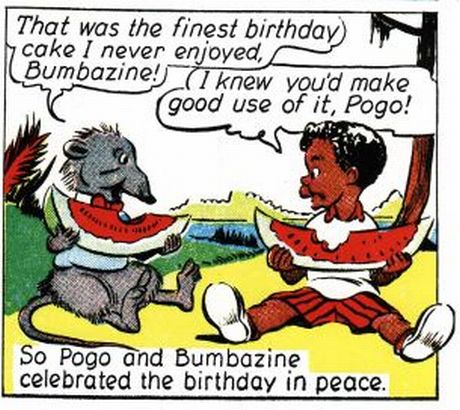Earlier this week R. Fiore wrote a post at The Comics Journal defending the honor of Walt Kelly from the suggestion (made by Thomas Andrae in the introduction to Walt Kelly’s Pogo The Complete Dell Comics: Volume One) that maybe, possibly, you could see something slightly racist in the fact that he used blackface caricatures.
Fiore’s piece is a graceless performance. He spins and sneers, insisting that this image of a black child with a watermelon is not playing into racist jokes about blacks and watermelons because Kelly isn’t malicious and the black kid is portrayed positively so the watermelon must have ended up in there totally by accident, really, it could just as easily have been grapes. There’s no substantive engagement with, or really even mention of, the fact that Kelly’s cartoon blacks are based in blackface iconography, nor any effort to grapple with what that means.
The really depressing thing is that there’s an interesting article struggling to get out from behind Fiore’s special pleading. Jeet Heer, in the comments to the post, argues that (contra Fiore) Kelly did use blackface iconography but that (as Fiore says) Kelly’s depictions of blacks were in fact better than those of some of his contemporaries. Brian Cremins, who has written in an academic context about Kelly, also suggests in comments that the minstrel tradition was very important to Kelly’s art and humor, and that that’s something to be investigated rather than denied or fled from. I’m not a fan of Kelly’s especially, and haven’t read many of his comics, but it’s clear that there’s a discussion worth having about his relationship to race and racism. It sounds, in fact, like Andrae was engaged in such a discussion.
But Fiore isn’t having it. Kelly cannot have been touched by racism — or, if he was, that only goes to show how utterly awesome and virtuous he really is.
At the outset, we must presume that Walt Kelly was more enlightened than Thomas Andrae, or you, or me. This is because unlike Walt Kelly’s, our enlightenment is socially assisted. Walt Kelly had to come upon his all on his own. Now, any of us might have been one of the enlightened people in those days, and all of us think we would have been one of the enlightened persons in those days, but the odds say otherwise, and in the actual event Kelly was. We simply embrace the conventional wisdom of our time. Kelly swam against the tide.
The suggestion that you or me or Fiore have reached some level of enlightenment which puts us beyond the touch of racism, and therefore beyond moral censure or praise as regards racism, is perhaps the least of the idiocies in this paragraph. The vision of Kelly as great artist, achieving his goal of perfect equality and watermelons without any input from anyone, inventing anti-racism out of whole cloth, without the intervention or help of any actual black people anywhere, is, for its part, familiar in import. Anti-racism here isn’t really a goal in itself; reading Fiore’s piece, it seems fairly clear that Fiore couldn’t possibly care less about racism, or about black people. Anti-racism is just a accoutrement of (white) genius, like a punchy prose style or a pleasing ink line. Fiore admires Kelly’s humanism; if that humanism is compromised, so is the admiration. Ergo, the admiration being fulsome, no racism can exist. QED.
Fiore’s a longtime TCJ hand, and here he manages to embody some of the least enlightening aspects of old school comics fan culture: its hagiography; its crippling insularity (racial and otherwise); its smug distrust of academia; and most of all its defensiveness.
The last couldn’t be more counter-productive. A critical establishment that reacts with panic and dyspepsia to the suggestion that obvious blackface iconography is obvious blackface iconography is not a critical establishment that anyone beyond the most hard-core nostalgists is going to find welcoming. Join Team Comics! We were using watermelons in a totally non-racist way 70 years ago, pat us on the back! If you want to make your art form look clueless, ridiculous, and not a little repulsive, this would be the way to do it. Fiore’s handwaving doesn’t so much distract from the racism of comics’ past as it raises embarrassing and painful questions about the racism of comics’ present.
________
Update: Brian Cremins has a lovely piece about Pogo, race, and nostalgia here.

